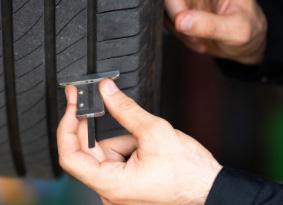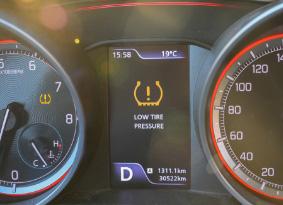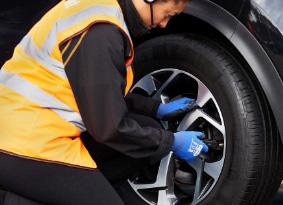Do you know the risks
of worn tyres?
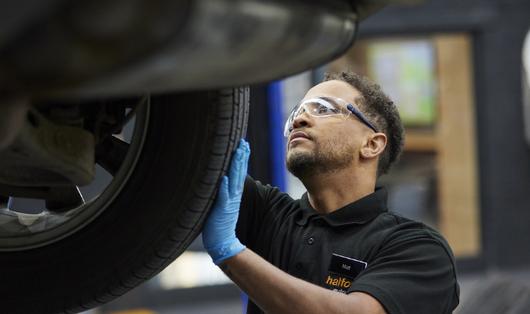
- Your car insurance will be invalid if your tyres are illegal.
- You could face fines up to £2500 and 3 points on your licence per illegal tyre.
- You could cause an accident and injure others with dangerous tyres.
Learn more about tyre safety in this online hub, with advice from our experts to keep you and your vehicle safe
What tyre aspects should I look out for?
It’s important to monitor your tyres to ensure they’re safe and road ready. To help you remember all the key areas, we’re supporting TyreSafe with their ‘A.C.T.’ campaign.
A.C.T. highlights the essential aspects of your tyres to check before embarking on any long journey:
-
Air Pressure
Uninflated or overinflated tyres can affect handling, so having the right tyre pressure is essential. -
Condition
Lookout for any cuts or cracks in your tyres, as well as glass or nails that could become embedded in the rubber. -
Tread Depth
Make sure your tread depth is above the legal limit of 1.6mm.
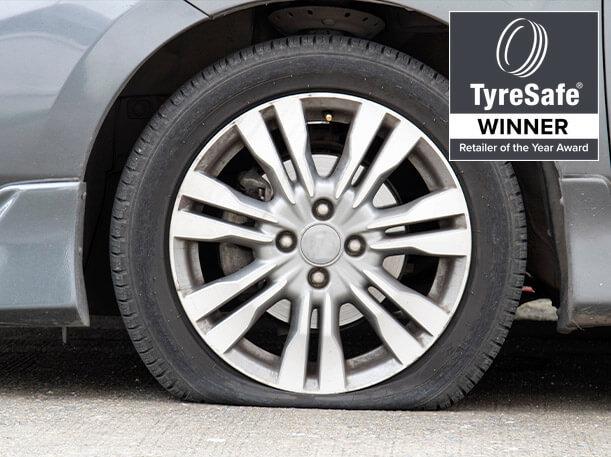
Benefits of driving with
safe tyres
-
Keeping your
insurance validInsurance policies require a car to be ‘road worthy' at the time of an incident, and since illegal tyres would fail an MOT, your cover would be void.
-
Avoid a fine
and points
on your licenseYou could receive 3 points and a fine of up to £2,500 per illegal tyre.
-
Avoid causing accidents on the road
Worn tyres make it harder
to stop in time.
Did you know?
-
There are an estimated 6.1 million illegal tyres on Britain’s roads – that’s 1 in 4 unsafe vehicles
-
Over 2 million cars fail their MOT due to tyre defects every year
-
On average, defective tyres result in the death or serious injury of 159 people every year
-
Over half of UK tyres are either illegal or borderline when they’re replaced
What are the signs of damaged tyres?
Low tread depth
The legal tread limit is 1.6mm, but we’d recommend replacing a tyre once the tread is below 3mm, as you’ll start losing grip on the road.
Cracks in the sidewall
Cracks can occur as the rubber in your tyres breaks down over time and with UV exposure.
Air loss
If you notice your tyres losing pressure faster than usual, you may have a slow puncture or other damage.
More vibration than normal
Excessive vibration through the steering wheel might mean there’s internal damage to one or more of your tyres.
Age
Even with regular care and attention, tyres will naturally wear over time and should be replaced roughly every five years.
Bulges
Any changes of shape or swelling, usually in the sidewall, can lead to a blowout while you're driving.
Every year, dangerous tyres lead to around 5,000 convictions,
900 casualties, and 160 deaths or serious injuries.
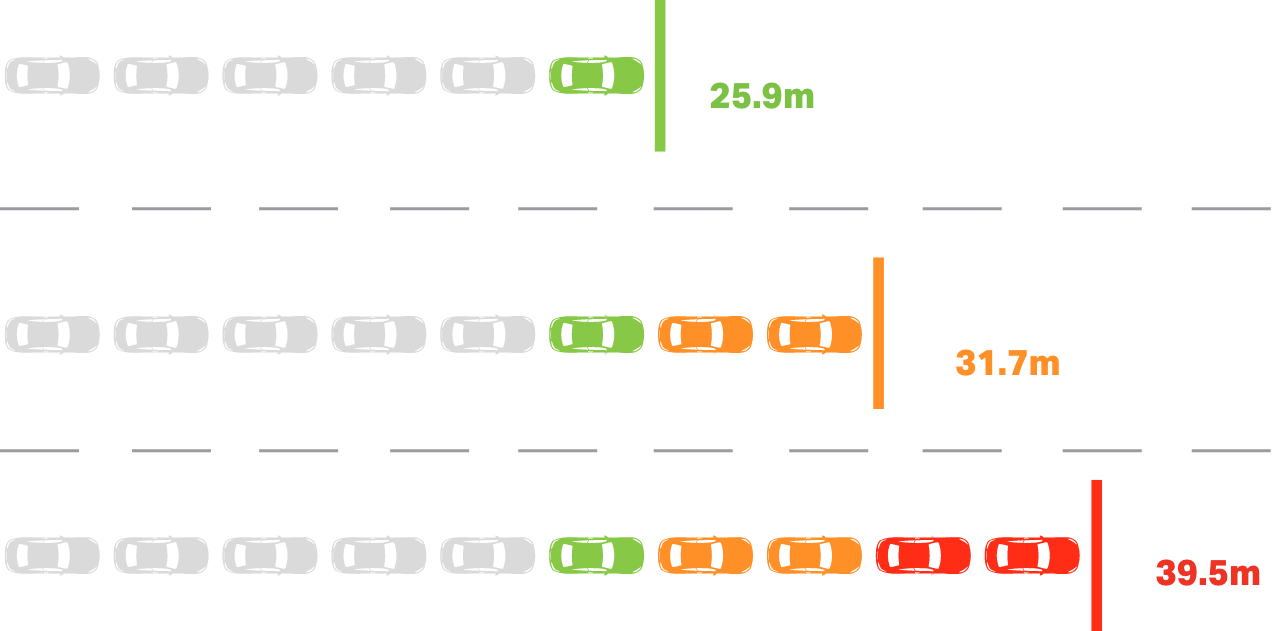
Stopping distance on a wet road from 50mph to 0mph
- Your car insurance will be invalid if your tyres are illegal.
- You face fines up to £2500 and 3 points on your licence per illegal tyre.
- You could cause an accident and injure others with dangerous tyres.
Your car insurance could be invalid if your tyres are worn beyond the legal limit.
Plus, you face fines of up to £2,500 and 3 points on your licence per illegal tyre.
Stopping distances based on independent tests carried out by Motor Industry Research Association (MIRA). Car lengths based on average of 4 meters.

Helpful guides for driving with safe tyres
Tyres Services
Tyre FAQs
We were voted TyreSafe Retailer of the Year, so you know you can trust us to keep you and your tyres safely on the road. Plus, our pricing team review our tyre prices against our competitors up to three times a week, so you can be confident you’re getting great value for money too. We also mobile tyre fitting by our highly qualified technicians and environmentally dispose of all used tyres. To shop tyres available for your vehicle, click here .
Every car is different, and you’ll find the correct tyre pressure in your owner’s manual or printed on the sill inside the driver’s door.
You can use a Halfords tyre pressure kit to measure your pressure. To get an even reading, you need to ensure that your vehicle is on a flat surface and that your tyres are cold as this will produce more accurate results.
You should check your tyre pressure and tread every few weeks to ensure your tyres are sufficiently inflated and still safe to drive on. Correct tyre pressure and tread are important for several key reasons:
- Illegal – driving with under-inflated tyres/low tread depth is illegal and can result in costly fines.
- Safety - poor tyre pressure/tread depth can lead to a higher risk of over/understeering, increased braking distances and aquaplaning.
- Cost reduction - tyres with incorrect pressure and worn tread will have a reduced life span and increased fuel consumption.
For more information, take a look at our guides on how to check and inflate car tyres and tread depth and safety.
You can book a FREE tyre check at your local Halfords garage, where we’ll make sure your tyres are safe and road-worthy to give you peace of mind on your journeys.
It includes a check of your tyre pressure, tread depth, and the visual appearance of your tyres, to make sure there’s no unusual lumps or sidewall damage. If there is a problem, we’ll advise you on what to do next.
1.6mm. It is recommended that you should change your tyres once down to below 3mm.
Independent research by the Motoring Industry Research Association (MIRA) has shown that tyres with 3mm of tread have an average 25% better performance than those at 1.6mm. That represents an extra 8 metres of stopping distance in wet conditions!
Tyres are considered illegal if the tread depth is below 1.6mm. Driving with tyres that are under the legal minimum is not only incredibly dangerous but can also result in you losing your license. You can receive 3 points and a £2,500 fine per illegal tyre. You also risk invalidating your insurance if you’re in an accident with illegal tyres.




